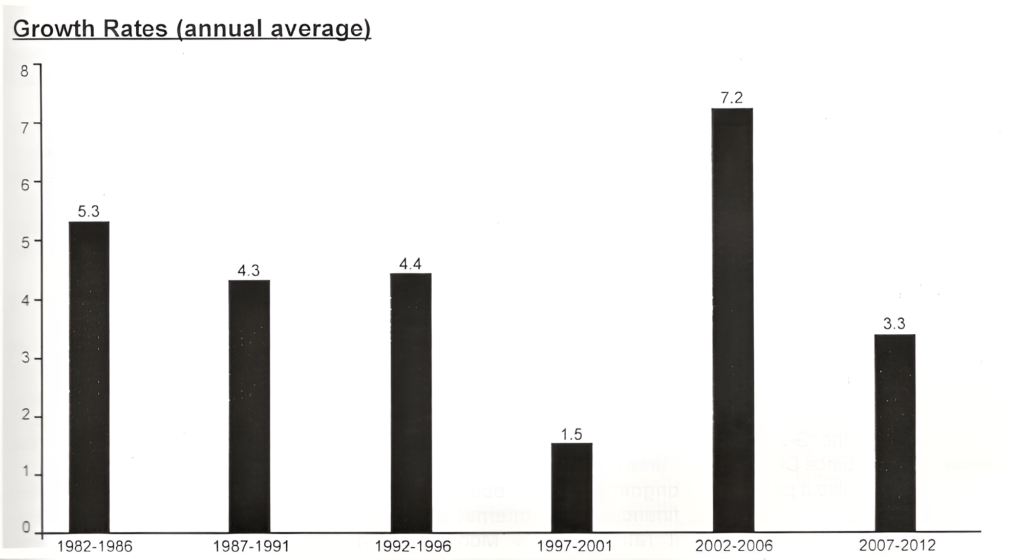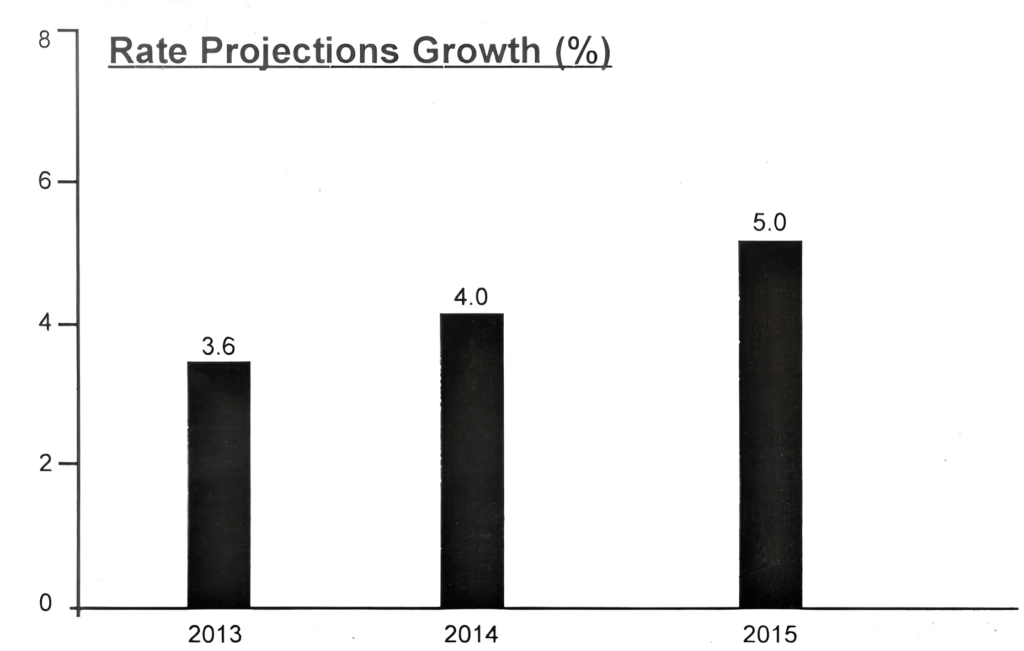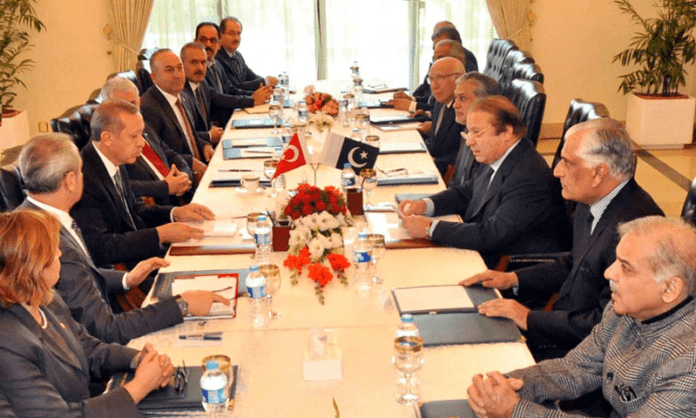Recently the Prime Minister of the Republic of Turkey H.E Recep Tayyip Erdogan visited Pakistan accompanied by a high level delegation including the Minister of Economy and the Minister of Transport, Maritime Affairs and Communication. A large number of prominent entrepreneurs and industrialists from leading private Turkish companies in the sectors of energy, construction, urban development and municipal services, public transport etc also accompanied Prime Minister Erdogan for participation in the Pakistan-Turkey Business Forum 2013.
Pakistan and Turkey enjoy unique relations which are unparalleled in the world, their bilateral relations are characterized by time-tested bonds of affinity, mutual respect and solidarity and draw their strength from the shared love of the two peoples. The two Prime Ministers exchanged views across the whole gamut of bilateral, regional and international issues in a warm and friendly manner.
Pakistan and Turkey being strategic partners pledged to intensify cooperation in energy, trade, urban development, infrastructure and housing sectors besides inking agreement to operationalise the Islamabad-Tehran-Istanbul ECO Container Train. It is hoped that regular operations of the train would not only strengthen connectivity but it also has the potential to harness greater economic integration between the region and beyond in the days to come.
| Prospective Joint Ventures & Investments | Details |
| Energy | Pakistan badly needs FDIs in the field of energy and both countries could start joint ventures in the sectors of renewables especially wind and solar energy. |
| Transport | Turkey has comparative advantage in the field of transportation and communication means. Lahore Metro-Bus Project is the prime example of it. Pakistan needs Turkish investment and expertise to flourish in transportation sector which would be win-win situation for both the countries. |
| Infrastructure | Pakistan’s needs Turkish blessings to prepare its Lahore-Karachi Motorway projects. |
| Textile | After the grant of GSP+ status, both countries must excel in the diverse fields of textile production. |
| Automobile | Pakistan’s Railways badly needs Turkish expertise for the sustained operations. |
| Agriculture & Sub Sectors | Mutual cooperation in the fields of food processing, dairy development and halal food would be game changer for both the countries. |
| Information Technology | Mutual cooperation in information technology would open new avenues of cooperation. |
| Oil & gas exploration | Pakistan has vast reservoirs of shale gas which needs to be explored and tapped with the help of Turkey. |
Both the Prime Ministers of Pakistan and Turkey expressed satisfaction at the progress in strategic partnership and reiterated their resolve to comprehensively upgrade bilateral relations across all areas of mutual interest, especially economic and commercial. They emphasized their firm belief in the strength of democracy and expressed determination to cooperate to achieve democratic ideals to the benefit of the brotherly people of the two countries. Both the prime ministers reaffirmed their abiding commitment for the socio-economic development of the people and to follow policies that bring qualitative improvement in the quality of life of people and prosperity to their respective countries. They condemned terrorism and renewed their resolve to increase bilateral cooperation against terrorism and organized crime and also expressed their desire to enhance cooperation in social sectors especially culture, education and tourism. Both agreed that improved cooperation in social sector fields would also serve as a vehicle for greater people to people relations between the two countries.
During the visit three MoUs and one Cooperation Protocol were signed between Pakistan and Turkey.
| Signing of MOUs | Details |
| Disaster Management | Turkey will provide technology, expertise and training to tackle disasters and their after effects. |
| Sports Cooperation | Turkey will provide essential training and expertise in the diverse fields of sports. |
| Pakistan’s Railways | Pakistan Railways and Turkish Logistics Organisation inked MOUs to extend expertise. |
| Pakistan Standard Quality Control Authority | PSQCA) and Turkish Standard Institution signed a MOUs for further enhancing of mutual cooperation |
The two prime ministers also agreed to follow up implementation of decisions taken at the High Level Strategic Cooperation Council Forum; conclude Pakistan-Turkey Preferential Trade Agreement (PTA) by the first half of 2014; facilitate investments by the private sector in both countries. Pakistan would especially encourage Turkish private sector for investments in the key sectors of energy, especially coal, hydroelectric and wind, infrastructure including motorways, roads and airports, low-cost housing and urban development & municipal services like public transport and solid waste management. Pakistan would also encourage Turkish state and private banks to open branches in Pakistan. Turkey ensured regular operations of Istanbul-Islamabad Container train for enhanced on-land connectivity between Pakistan and Turkey, further strengthen existing cooperation and partnership in security and counter-terrorism related issues, further deepen our defence cooperation through exploring the possibility of joint defence production and allied Research and Development and learn from each other’s best practices in skill development and vocational training programs.
During the visit both countries agreed to enhance cooperation between educational institutions of the two countries. The two sides agreed to increase the number of scholarships to students to pursue undergraduate, graduate and post graduate level studies in both countries in the fields of engineering, technology, medicine and management sciences. Both sides were also agreed to promote cooperation in the field of tourism and preservation and restoration of historical and archaeological sites; and closely coordinate and consult each other bilaterally as well as multilaterally to promote regional peace and security.
Current trade volume between Pakistan and Turkey hovers around $US 83 million which does not translate the actual trade potential existed between the two countries and both countries decided to increase bilateral trade volume up to $US2 billion in 2014-2015 through greater economic integration, exchange of business delegates, investments and joint ventures. The recent visit of Turkish prime minister along with more than 39 private companies opened a new trade chapter between the two brotherly countries.
Turkish Economic Model
Turkey macro-economy is stable and strong. It has been on the path of a sustainable economic development which is now a rarity in the ongoing global economic crisis and financial crunch. Turkey’s economy is defined as an emerging market economy by the International Monetary Fund (IMF) and is largely developed. It is making Turkey one of the world’s newly industrialized countries. Now Turkey is among the world’s leading producers of agricultural products, textiles, motor vehicles, ships and other transportation equipment, construction materials, consumer electronics and home appliances.

Rigorous institutionalization of economic, banking and financial reforms has transformed Turkish economy into one of the leading economies in the region and the globe. A few years ago, the global economic recession did not put any negative impact on Turkey economy and now Turkey is one of the fast developing countries, as its GDP growth rate remained at four percent during first quarter of the current year. Turkey is one of the ideal destinations in terms of foreign direct investment (FDIs). Healthy combination of public-private sector put the Turkey on the road to greater industrialization, diversification of economy, energy resources, and the last but not the least, widespread of Small and Medium Enterprises (SMEs) in the country.

According to World Bank Turkey has the world’s 16th largest nominal GDP, and 15th largest GDP by PPP. It is a founding member of the OECD (1961) and the G-20 major economies (1999). Since December 31, 1995, Turkey is also a part of the EU Customs Union.
While many economies have been unable to recover from the recent global financial recession, the Turkish economy progressed by 9.2 percent in 2010, and 8.5 percent in 2011, thus standing out as the fastest growing economy in Europe, and one of the fastest growing economies in the world.
Turkey’s economic model drives its strength from its political stability due to which Turkey is the 6th major economy in the European Union (EU) and 16th at global level. Corporate governance is at its best throughout the Turkey. Its government has already initiated many effective anti-corruption measures at every level horizontally and vertically. Gradual economic liberalization, prudent drive of privatization, friendly tax reforms and incentives along with business friendly environment has revolutionized its sinking economy. More than $150 billion worth of exports is a great example of how robust its economy is. Now, Turkey the pride of Islamic World is on the path of greater socio-economic prosperity.
Turkey put in order a legal framework and an accurate banking system for business that is why Turkish economy is growing at rapid pace. Despite the massive banks default and financial crunch in the European Union, America, Africa and Latin America none of its banks defaulted. During his recent visit the Turkish prime minister offered to provide its economic development roadmap to Pakistan to put the country on the path to speedy development.
The Turkish Stock Market and credit rating agencies have responded positively. According to The Economist, share prices in Turkey nearly doubled during the ongoing global economic and financial crisis. International credit rating agency Moody (2010) upgraded Turkey’s rating for its immense stability and sustainability in the economy. Fitch upgraded (2012) its credit rating to investment grade (long-term foreign currency Issuer Default Rating (IDR) was upgraded to BBB- (from BB+) and long-term local currency IDR was upgraded to BBB (from BB+)) after an 18-year gap. Once again Moody (2013) upgraded its credit rating.
Pak-Turk Bilateral Relations
Pakistan regards Turkey as its closest ally in international arena which share common linguistic, historical, religious and geo-graphical characteristics. Both countries need to have qualified human resources and use this qualified HRM to produce wealth and technology in order to get a share from international power structure.
Strategic Partnership
Emerging geo-political and geo-strategic trends in the region and the world has already forced both the countries to prepare a common strategy in order to meet the different challenges which are given below as:
(a) NATO’s withdrawal from Afghanistan (Afghanistan-Pakistan-Turkey Trilateral Forum is the ideal forum)
(b) Peace process between Iran and the Western Countries including US
(c) Shift in US foreign policy towards India and Pakistan
(d) Further strengthening of military cooperation (9th High Level Military Dialogue Group suggested to have joint venture for T-129 Combat Copter between the two countries)
(e) Military Software cooperation
(f) Water technological cooperation since Turkish has comparative advantage and Pakistan is water deficit country
(g) Expansion of airports, infrastructure etc.
(h) Mono Railways project on Lahore canals
(i) Construction of low-cost housing projects
Conclusion
A lot of MOUs and agreements have been signed during the Turkey PM’s visit. Now it time for strong political will and sharing of experiences and expertise in order for activities to materialize in the fields of education, economy, security, constabulary, municipalism, renewable energy and defence for our country.





